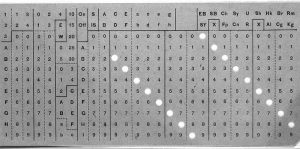Database
Throughout the passing of time, all human history has written down all the events and moments that the world has seen and lived, this not only refers only to history, but also includes arts, philosophies, inventions and economic developments contemplating their negotiations, exchanges and laws among other things. This is why all over the world, every country has stored from the beginning the information in places like museums and libraries, nowadays in digital archives; this is called database.
What is a database?
A database represents a collection of information organized all within a computer so that, it can select and handle information fragments quickly and easily when needed.
Definition
Databases are a compendium of information encompassing the same context, which are stored systematically for later use or by the user through a computer.
These may include not only information for reading but also, numerical files and multimedia content such as images or videos.
Characteristics
- It allows the human being to access different sources of information in an organized way.
- In the area of business and companies, allows the Human Resources area to have at its disposal all the information regarding its personnel and about changes within it.
- In science, it allows scientists and researchers to access field tests and experiments as well as theoretical information.
- It allows citizens to search for contact information about other people and companies.
Elements
A database consists mainly of three elements:
- A field, which represents the unique piece of information.
- A record, which represents a complete system of the information field.
- A file which represents the compendium of information and file which composes the database.
What is a database for?
Databases allow us to store and verify records, data and files relating to areas such as sales operations, creation processes, product catalogues, warehouses and inventories, field tests, customer profiles, among many other informative data that can be stored.
Generally, in order to manage all this information, file managers are used, which allow the user the possibility to control and manage readings and writings of the files, specifying the creation of reports and analyses of use.
These are usually used mostly in companies for internal management such as personnel and inventory organization, thus reducing the tedious procedures that means to organize information manually (physically through paper files, assuming large expenses on stationery).
At the same time it is also widely used within the scientific area, where databases store information from different experiments that are done in order to reduce the margins of error in subsequent experiments.
Origin
Even though, when we speak of database, the term is directly associated with the computer area, but its origin is found in the first Egyptian civilizations and ancient Rome and Greece.
The Egyptians told their stories through wall paintings in palaces so that future generations would know the stories of their ancestors.
In Rome and Greece, there were scribes who were not only responsible for writing the nations’ history, but also for keeping a trade record of transactions between kings and also, between their people’ merchants.
History
The first databases we can find were the archives collected in Italy that were gradually stored creating the first libraries where philosophers, inventors and historians went to study the ancient history and progress of towns.
With time, the world began to realize that databases were becoming larger, so it was very difficult to contain all that information, in turn, companies had to have exclusive areas determined to data files of those companies.
For this reason, with the first computer advancements, engineers, before talking about color gamma or versatility issues, set themselves the utilitarian goal of storing information on a large scale inside computers, to replace the creation of large rudimentary files. This is how the first storage disks are created, as well as portable storage disks (cassette and floppy disk).
How a database works?
- Gather all the information you want to store.
- It is systematically grouped in order to maintain a correct distribution for easy access.
- The information is stored inside a processor (a computer) so that, it has the information at the time it is needed.
Types
The different database types are classified according to each context they encompass:
- The former are classified according to their variability with respect to the database:
- Static databases: These are those databases that are made up solely of reading data, these are used primarily to store historical data, which are used to study the behavior and data evolution such as for example, those used by companies to study evolution.
- Dynamic databases: these are databases that store information and, over time, are modified for operations such as data updates or data editions. The most common databases of this type are those used in supermarkets, which are under constant review.
- The second classification is according to the content stored in it:
- Bibliographic databases: They only store subrogate information from the primary source, allowing it to be easily located. The easiest way to explain this is that it refers to all information from authors regarding their works (Publication date, edition, editorial, among others), along with a summary or small extracts from their works.
- Full-text information databases: These are the most common to see because they store primary data sources such as all editions of a newspaper or journal collection. Full-text databases are usually separated into two parts: personal or business where they are given the name of white pages and yellow pages.
- There are three types of business directories:
- Those which contain the company name and address.
- The ones that include contact information such as your phone number and mail.
- Those that contain information for internal use such as your billing, payroll and national codes.
- Chemical or Biological Information Databases (Libraries): These are no more than the databases where information relating to life sciences, medicine or chemistry is stored and separated into several subtypes:
- The bases that store sequences of proteins or nucleotides.
- Databases that contain information on metabolic pathways.
- Databases where 3D structures of biomolecules are stored together with data from field experiences.
- Databases of clinical histories.
- Bibliographic databases.
Models
There are numerous databases models, some of the most prominent are:
- Hierarchical databases: in this database all the information starts from a central node which is the main topic, and it is subdivided into smaller nodes where the information is found.
- Network databases: this is a model similar to the hierarchical one, its difference lies in that not all the minor nodes start from a main one, but each minor node presents a major node.
- Transaction database: these are the least seen models and their only purpose is to send and receive information quickly regarding the analysis of a finished product.
- Relational databases: in this model the way in which the information is placed has no relevance, since its main objective is to allow the information to be reviewed in a simple and easy to understand way.
- Multi-dimensional databases: this model is a system created for ideas and applications development, based on metric or measurement tables.
- Object-related databases: this model incorporates state and behavioral information, so they are mostly seen in scientific areas.
- Documented databases: this model is based mainly on information stored on a large scale, mostly stories and world background.
- Deductive databases: this model allows to make within the same database interactions with the information in order to create inferences or opinions in the information.
- SGBD: is a digital system that allows the storage of information from multiple places all connected by the same network.
Importance
Databases allow the world to handle large amounts of information in an easy and simple way in order to facilitate work in all areas of human development and in turn, understand the entire evolutionary process that it has gone through.
Examples
- Coca-Cola internal production system.
- ZDC research history type database.
- Database Management System.
- Customer-product analysis system, SONY.
How to cite this article?
Briceño V., Gabriela. (2019). Database. Recovered on 4 January, 2025, de Euston96: https://www.euston96.com/en/database/










